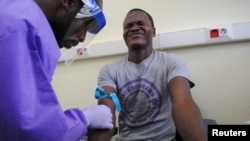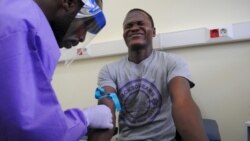While the outbreak of Ebola Hemorrhagic Fever that killed more than 11,000 people in West Africa is tailing off, it is not over. Still, today about 20 new cases are reported each week, down even from the 100 from March and April.
“Without a doubt, the reason we have seen such results is because we stood as a united front in combating the disease,” said USAID Acting Administrator Alfonso Lenhardt at the recently held UN International Ebola Recovery Conference.
Without a doubt, the reason we have seen such results is because we stood as a united front in combating the disease."USAID Acting Administrator Alfonso Lenhardt
The epidemic may be waning, but its effects ripple far beyond the disease itself. “Young people stopped going to school, and trade declined as countries closed their borders,” said Acting Administrator Lenhardt. “The outbreak stretched the limits of entire institutions – from health ministries to infrastructure – that must now be rebuilt.”
According to World Bank estimates, for example, if health workers that had been lost to Ebola are not replaced, maternal mortality in Guinea, Sierra Leone and Liberia may increase by around 4,000 extra deaths each year.
Clearly, getting to zero—no new cases-- will require a major push from governments, donors, international aid groups and NGOs.
Last Spring, as the great scope of the Ebola epidemic became clear last year, the United States stepped up to help, providing more than $2 billion for response efforts, including funding and training 1,500 healthcare workers, delivering equipment and medicines and setting up laboratories and hospitals.
Now, to help with the recovery, the U.S. Government will provide an additional $266 million. These funds will help Liberia, Sierra Leone and Guinea fix critical gaps in the health care and emergency response systems, and address secondary impacts caused by the Ebola crisis.
“As we continue on the road to ‘zero cases’, the United States is here to support the people of West Africa as they begin the long process of rebuilding and restoring their livelihoods and personal development,” said Acting Administrator Lenhardt.
“[The United States] remain[s] committed to supporting our partners in each country as they transition from crisis to recovery.”














